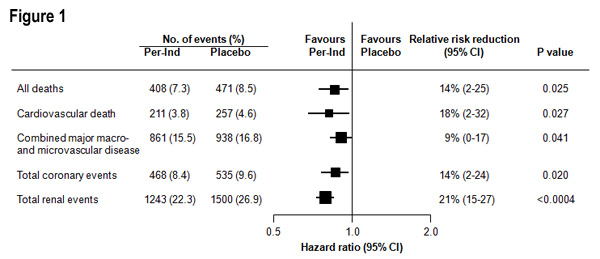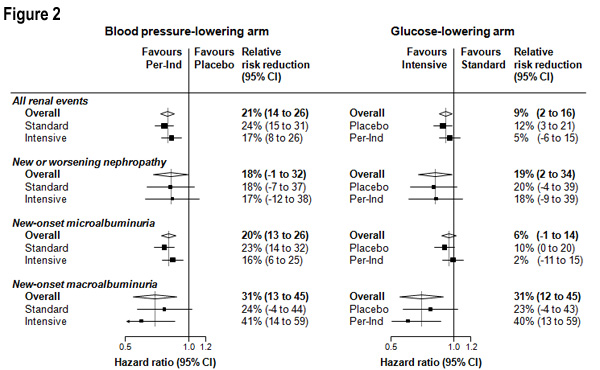Since the first publication of the Action in Diabetes and Vascular Disease: Preterax and Diamicron MR Controlled Evaluation (ADVANCE) Trial (1), further findings have been published. New data regard the blood pressure and the glucose lowering arms, atrial fibrillation and renal outcome.
1. Blood pressure lowering arm
Initial results from the blood pressure lowering arm published in 2007 had demonstrated that the perindopril/indapamide fixed combination, in addition to background treatment exerts beneficial effects on blood pressure values (1). A reduction in systo-diastolic values amounting to 9/8 mmHg, with a significant decrease in all-cause mortality (-14%), cardiovascular mortality (-18%) and major cardiovascular events (-9%) were observed (Figure 1).
Further recent anayses report that the perindopril/indapamide combination:
- Has detectable beneficial effects in a wide range of patient subgroups according to a) blood pressure values at study entry < or > 140/90 mmHg, b) presence or absence of other blood pressure lowering treatments, or c) concomitant administration of statins and/or antiplatelet agents.
- Has similar efficacy and safety, as well as a similar risk reduction for primary and secondary endpoints in patients aged below 65 years and in those aged 75 years or more (2).
- Has blood pressure lowering effects that are not affected by a given patient's cognitive dysfunction even though cognitive dysfunction will increase the risk of cardiovascular outcomes (3).
- Intervenes effectively on the cardiovascular risk profile diabetic patients.
- Holds significantly greater benefit in terms of risk reduction in high risk patients.
Additional analysis reports on the relative importance of various blood pressure values as determinants of cardiovascular risk in a diabetic population (5). Results indicate that systolic blood pressure and pulse pressure are the two most effective predictors of coronary and cardiovascular events in the diabetic population, while mean arterial pressure and diastolic blood pressure fail to show such predictive value.
2. Glucose lowering arm
The glucose arm had addressed a question with important clinical implications, i.e. whether intensive glucose control (glycated hemoglobin = 6.5%) exerts cardioprotective and nephroprotective effects greater than those achieved by standard glucose control (glycated hemoglobin 7-7.5%) (6). To this aim more than 11000 diabetic patients were treated with glicazide modified release (30-120 mg) added to other treatments or with standard drugs for a mean follow-up of 5 years.
Results showed the benefit of a more intensive glucose control, with a 10% relative reduction in the combined outcome of major macrovascular and microvascular events (the primary study end-point), and a 21% decrease in the occurrence of renal insufficiency and failure. The trial also provided information on another issue of clinical relevance, i.e. the safety profile of the two interventions (6). Severe hypoglycaemia was indeed rare however it was more common in the intensively-treated than in standard-treated control group. (2.7% vs 1.5%, p <0.001). This was not an unexpected finding nevertheless it calls for close following of diabetic patients undergoing strict glucose control.
More recent study of the combined effects of routine blood pressure lowering and intensive glucose control on cardiovascular and renal outcomes (7), reported the benefits of the pharmaceutical intervention on renal events (including microalbuminuria) and death for any cause (Figure 2).
3. Atrial fibrillation
A further set of data reports on the occurrence of atrial fibrillation in diabetic patients and the impact of the perindopril/indapamide fixed combination on it(8). Results can be summarised as follows:
- Atrial fibrillation is common in diabetic patients (incidence close to 8%) and is associated with an increased risk of all cause mortality (+61%), cardiovascular events (+77%), cerebrovascular events (+68%) and heart failure (+68%).
- Risk of atrial fibrillation is higher in diabetic than in non-diabetic diabetic normotensives.
- Treatment reduces cardiovascular risk in patients with atrial fibrillation to an extent significantly greater than in controls.
- Protection offered by the the combination treatment is particularly evident in terms of incidence of cerebrovascular events or major coronary events.
4. Renal outcomes
Treatment with perindopril/indapamide fixed combination had been reported to provide significant renal benefits (1). Renal outcomes were improved with combination treatment, which was associated with clearcut reductions in the risk of developing microalbuminuria, in the risk of developing overt nephropathy or worsening renal function (overall risk reduction -21%, P< 0.0001) (9).
Recent publications have reported that the combination treatment in renal failure patients also has favourable effects on cardiovascular death (-20%) and major coronary events (-13%), particularly in patients with more advance kidney disease (10).
Figure 1. Effects of blood pressure lowering on death and macrovascular and microvascular disease (coronary and renal) in the ADVANCE Trial. Figure modified from Ref 1.
Figure 2. Effects of blood pressure lowering and intensive glucose control intervention on renal events in the ADVANCE Study. Figure modified from Ref 7.




 Our mission: To reduce the burden of cardiovascular disease.
Our mission: To reduce the burden of cardiovascular disease.